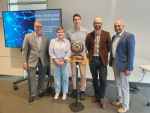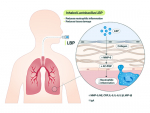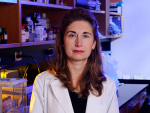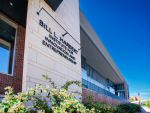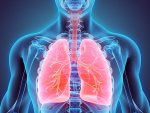Displaying items by tag: harbert institute for innovation and entrepreneurship
Michael Niederweis, Ph.D., and Cynthia Owsley, Ph.D., who collectively hold 23 patents, have been recognized for approaches to DNA sequencing and detection of impaired dark adaptation, respectively.
Tagged under
Rothenberg’s innovative, FDA-approved technology will improve cardiac health through enhanced treatment and prevention.
Tagged under
Yager’s journey as a Blazer is filled with institutional, national and international recognition; her most recent milestone is her unique patented catalytic reactor for NASA missions that has multiple applications in various other industries.
Tagged under
Blazer Bridge Fund provides financial support to innovative ideas and inventions by the UAB community, encouraging advanced discovery.
Tagged under
- release
- harbert institute for innovation and entrepreneurship
- school of medicine
- school of engineering
- college of arts and sciences
- department of neurosurgery
- department of neurology
- department of mechanical engineering
- department of pediatrics
- department of electrical and computer engineering
- department of dermatology
- department of endocrinology, diabetes, and metabolism
- department of ophthalmology and visual sciences
- department of physics
- artplay
- uab arts
This live biotherapeutic product, tested in mouse models, shows promise in addressing common pathways of lung disease progression.
Tagged under
The novel drug TIX100 functions differently from any approved diabetes drug to promote proper islet cell function.
Tagged under
Fobian developed Retraining and Control Therapy, or ReACT, to help patients with functional neurological disorder, or FND, which affects an estimated 300,000 Americans.
Tagged under
Ninety-two percent of evaluable patients treated with INB-200 exceeded a median progression-free survival of seven months. Glioblastoma multiforme is the most aggressive type of cancer originating in the brain.
Tagged under
Awards and honors continue for the PRCA/PRSSA at UAB chapter, where students put their classroom learning into real-world practice, preparing them for careers and vaulting them into the professional world.
Tagged under
National conference hosted by UAB attracts entrepreneur educators from around the nation to Birmingham.
Tagged under
UAB received the IEP Innovation award, recognizing exemplary initiatives spurring innovation, entrepreneurship and technology-based economic development.
Tagged under
Tagged under
- release
- school of medicine
- office of the president
- vice president for research
- undergraduate research
- research administration
- strategic plan
- school of dentistry
- school of optometry
- school of health professions
- school of public health
- collat school of business
- school of engineering
- school of education
- college of arts and sciences
- uab medicine
- harbert institute for innovation and entrepreneurship
- school of nursing
- xenotransplantation
- xenotransplantation program
Vivek Lal, M.D., associate professor in the Department of Pediatrics at UAB Heersink School of Medicine and the founder of both ResBiotic Nutrition and Alveolus Bio, was given the 2023 Award for Excellence in Entrepreneurship.
Tagged under
- release
- harbert institute for innovation and entrepreneurship
- school of medicine
- department of pathology
- department of pediatrics
- department of urology
- department of medicine
- division of pulmonary allergy and critical care medicine
- department of biochemistry and molecular genetics
- college of arts and sciences
- department of biology
- department of chemistry
- school of engineering
This new grant will be used to develop a full-scale family of devices for inhaled nitric oxide delivery for patients with pulmonary hypertension that can be used in health care facilities and for at-home care.
Tagged under
The Blazer Bridge Fund is intended to identify and assist in the development of promising ideas, discoveries, innovations and/or technologies from UAB faculty and staff that have commercial potential.
Tagged under
- release
- harbert institute for innovation and entrepreneurship
- school of education
- school of engineering
- school of medicine
- department of otolaryngology
- department of anesthesiology and perioperative medicine
- department of microbiology
- department of medicine
- division of hematology and oncology
- division of pulmonary allergy and critical care medicine
- division of gerontology geriatrics and palliative care
IN8bio has opened a new Birmingham facility, a 10,000-square-foot advanced research and development laboratory in the Martin Biscuit Building at Pepper Place.
Tagged under
The Alabama Innovation Corporation awarded two UAB startups with grants during the second round of Innovate Alabama Supplemental Grant awards.
The panel discussion will help navigate through the daunting, complicated process of launching a startup for passionate entrepreneurs.
The grant validates the science of Alveolus Bio, and the funds will support development of first-of-its-kind inhaled biotherapeutics to treat chronic lung diseases.
Tagged under
The funded project began Jan. 1 and is expected to run for two years. The proposal focuses on developing a novel dental pulp capping material by improving bioactivity of pulp tissue while achieving ideal mechanical properties.
Tagged under

